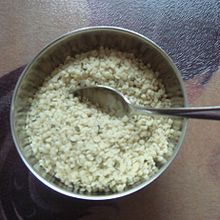Uses
Hemp is used for a wide variety of purposes, an estimated 50,000 products can be produced from hemp in the United States, including the manufacture of cordage of varying tensile strength, everlasting clothing and nutritional products. The bast fibers can be used in 100% hemp products, but are commonly blended with other organic fibers such as flax, cotton or silk, for apparel and furnishings, most commonly at a 55%/45% hemp/cotton blend. The inner two fibers of hemp are more woody, and are more often used in non-woven items and other industrial applications, such as mulch, animal bedding and litter. The oil from the fruits ("seeds") oxidizes (commonly, though inaccurately, called "drying") to become solid on exposure to air, similar to linseed oil, and is sometimes used in the manufacture of oil-based paints, in creams as a moisturizing agent, for cooking, and in plastics. Hemp seeds have been used in bird seed mix as well.[17] Hempseed is also used as a fishing bait. [18][edit] Food
Hemp seeds contain all the essential amino acids and essential fatty acids necessary to maintain healthy human life.[19] The seeds can be eaten raw, ground into a meal, sprouted, made into hemp milk (akin to soy milk), prepared as tea, and used in baking. The fresh leaves can also be eaten in salads. Products include cereals, frozen waffles, hemp tofu, and nut butters, to name a few. A few companies produce value added hemp seed items that include the seed oils, whole hemp grain (which is sterilized by law in the United States, where they import it from China and Canada), dehulled hemp seed (the whole seed without the mineral rich outer shell), hemp flour, hemp cake (a by-product of pressing the seed for oil) and hemp protein powder. Hemp is also used in some organic cereals, for non-dairy milk[20] somewhat similar to soy and nut milks, and for non-dairy hemp "ice cream."
Within the UK, the Department for Environment, Food and Rural Affairs (Defra) has treated hemp as purely a non-food crop. Seed appears on the UK market as a legal food product, and cultivation licenses are available for this purpose. In North America, hemp seed food products are sold, typically in health food stores or through mail order. The United States Department of Agriculture estimates that "the market potential for hemp seed as a food ingredient is unknown. However, it probably will remain a small market, like those for sesame and poppy seeds."[21]
A survey in 2003 showed that more than 95% of hemps seed sold in the EU was used for animal feed (bird seed, bait for fishing)[9]
[edit] Nutrition
| This article appears to contradict the article Essential amino acid. Please see discussion on the linked talk page. Please do not remove this message until the contradictions are resolved. (August 2010) |
Hempseed is an adequate source of dietary fiber, calcium and iron, and contains antioxidants and chlorophyll. Whole hempseeds are also a good source of phosphorus, magnesium, zinc, copper and manganese.
Hempseed is usually very safe for those unable to tolerate nuts, gluten, lactose, and sugar. In fact, there are no known allergies to hemp foods.[citation needed] Hempseed contains no gluten and therefore would not trigger symptoms of celiac disease.[citation needed]
[edit] Storage
Hemp oil can spontaneously oxidize and turn rancid within a short period of time if not stored properly; it is best stored in a dark glass bottle, in a refrigerator or freezer (its freezing point is –20 °C). Preservatives (antioxidants) are not necessary for high quality oils that are stored properly.[edit] Dietary supplement
Hemp oil has been shown to relieve the symptoms of eczema (atopic dermatitis).[25]Hemp Seed contains a large dietary supplement of omega-3, higher even than walnuts which contain 6.3% of n-3.
[edit] Medicine
Main article: Medicinal cannabis
Hemp oil has anti-inflammatory properties.[26]**This article is taken from wikipedia.com


No comments:
Post a Comment